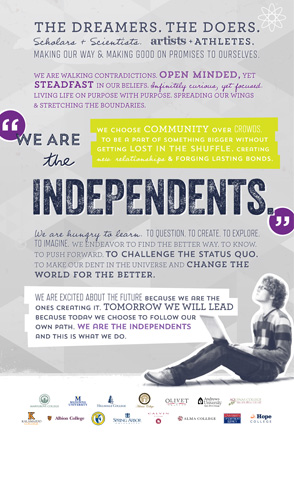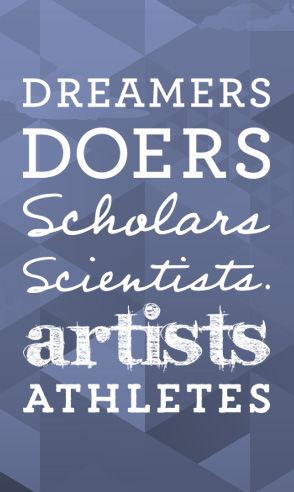Blog
Alma College iGEM team Examines Soil Cleanup at Local Superfund Site
Originally posted at https://www.alma.edu/live/news/2600-alma-college-igem-team-examines-soil-cleanup-at.
The Alma College iGEM team, competing at an international synthetic biology competition for only the second time, won a gold medal in November for a project being developed to break down the chemical compounds in contaminated soil at the Velsicol Superfund site in St. Louis, Michigan.
The nonprofit International Genetically Engineered Machine (iGEM) Foundation brings together more than 6,000 participants from across the world every year for its annual Giant Jamboree, which they deem “the largest synthetic biology innovation event in the world.” Synthetic biology is a field of science that involves redesigning organisms for useful purposes by engineering them to have new abilities.
The Alma College 2019 team won a silver medal at the Giant Jamboree last year for their project, the development of a counteracting bacterium to degrade Trimethylamine, or TMA, which promotes plaque formation in arteries. Devin Camenares, assistant professor of biochemistry and IGEM coordinator, said this year’s team improved to win a gold medal, despite restrictions put in place as a result of the COVID-19 pandemic.
“There were definitely challenges in terms of organizing the team and getting the work done, but the students rose to the challenge,” said Camenares. “They did a really job good of preparing themselves, communicating over the summer and completing their projects. I’m excited to see what they come up with next year and beyond.”
Abbey Killian, a junior from Traverse City and vice president of the Alma College team, said the team focused on two aspects of the ongoing soil cleanup project: one that made the project less expensive and another that made it less harmful to the environment.
Velsicol Chemical Corporation, and its predecessor Michigan Chemical Corporation, produced various chemical compounds from 1936 until 1978, when the plant shut down. The chemicals polluted the groundwater, soil and Pine River that bordered the plant. In the early 1980s, the factory was demolished, but pollution remains to this day. Federal and state agencies, as well as local groups and volunteer organizations, have for many years committed to cleaning up and rehabilitating the site.
Killian said the Alma College team is working to develop a bacterium that, when applied to soil and water samples from the Velsicol site, would be able to determine the severity of toxicity in those samples. Such a measuring stick would enable groups like the U.S. Environmental Protection Agency (EPA) to better focus their resources on impacted areas.
“We did a cost-benefit analysis and determined that this biosensor could save hundreds of thousands, if not millions of dollars annually,” said Killian. “When we made contact with the EPA and told them about our findings, they were very interested. We think our biosensor could not only save money, but also time.”
In addition to the “biosensor,” the iGEM team is also working to develop a new way to break down the chemical compound dichlorodiphenyltrichloroethane (DDT) and its derivatives, which are some of the most common contaminants at the Velsicol site. By capitalizing on the fact that full or partial pathways to degrade DDT already exist in nature, Killian said, the team is showcasing how synthetic biology can be used in a practical way.
“We want to take this chemical that exists in nature and change it in a way that is environmentally friendly,” Killian said. “It’s an ambitious goal, but if we succeed, we’ll be able to revive an ecosystem that has been damaged by problems from the past, while minimizing the risk to the future.”
The Alma College team created content for a number of media platforms to discuss the raw science it was producing in college laboratories, including a podcast, a website and a web video that mimicked a 1980s TV broadcast. iGEM teams typically present their findings in person at the Jamboree, but Camenares said that this year’s event was entirely virtual due to the pandemic.
“One of the aspects of iGEM that I really appreciate is that it forces students to not only do the research, but to communicate their findings in a way that is accessible to the public. That makes your circle wider, which means your project is more influential,” Camenares said. “The students really took advantage of the restrictions brought upon by the pandemic and produced some clever media to disseminate their message.”
Creating the “TV broadcast” led to collaborations with the student-run production company Bitworks, as well as the Alma College Theatre Department. With student “reporters” carrying large microphones on-screen, and distortion that resembled a video cassette recording, Killian said the video was an especially memorable way to get their message across.
“We decided to do an ’80s-themed video because the contamination primarily took place in the 1970s and ’80s,” she said. “It ended up being a really cool, fun collaboration with different groups across campus.”
While the results are encouraging thus far, Killian and Camenares said, the team is not finished looking into the Velsicol site. They intend to return to the competition next year — which is tentatively scheduled to be held in Paris, France — and repeat their gold medal effort.
“It felt great to improve on last year’s result and win a gold,” Killian said. “We want to keep on improving, by adding new members to our team and having the same success, on a truly international stage.”
Team members included:
Connor Arens ’22, White Lake
Gary Carter ’23, Niles
Elizabeth Elliott-Redlin ’23, Kalamazoo
Paul Fischer ’23, Bloomfield Hills
Pedro Granja ’21, Juigalpa, Nicaragua
Rhianna Haynes ’22, Lake Isabella
Madison Hibbs ’22, Whitmore Lake
Kaissidy Homolka ’23, Petersburg
Abbey Killian ’22, Traverse City
Paige Lamoreaux ’24, Benzonia
Ruby Lovasz ’22, Clio
Marleigh Matthews ’21, Davison
Aryaan Misra ’23, Noida, India
Izzy Oakley ’22, Trenton
Tatym Plath ’21, Perrinton
Kaleb Ramon ’21, Mount Pleasant
Gavin Swiecicki ’23, Bay City
Kelsey Taylor ’21, Plymouth
Commitment to education beyond the classroom is a hallmark of Alma College and Michigan’s top 14 private colleges and universities. Purposefully smaller, the colleges and universities pride themselves on helping students follow their own path, engage in the world around them, and find their passion. They emphasize community over crowds and a spirit of togetherness and cohesion.
Be bold. Be different. Go independent.





















